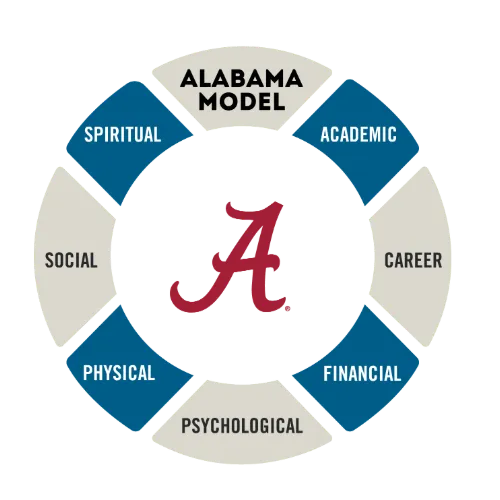Substance use among college students is a significant issue, with high prevalence rates of alcohol, marijuana, and other drug misuse affecting academic performance and overall well-being. Health Promotion and Wellness is devoted to educating UA students on how substances can lead to negative outcomes that change their overall wellness.
Presentations
Explore our available presentations below, and visit the presentation request page to schedule one for your group.
Alcohol Misuse
Learn how to recognize signs of alcohol or drug misuse and apply at least one effective support strategy in response.
Alcohol Know the Basics
Understand what defines a standard drink size and how alcohol physiologically affects the body.
Substance Use: Understanding the Language
Discover how the words we use can shape conversations around substance use and learn how to talk about it with empathy and respect.
Not Just Letters: Substance Awareness and Leadership
This presentation is tailored for Greek organizations to spark real conversations about substance use, challenge common myths, and empower members to lead with action through active bystander strategies.
The Alabama Model
This wellness framework highlights the many interconnected aspects of well-being, from emotional and physical health to social and environmental factors. Focusing on all dimensions encourages a more holistic and balanced approach to health.
When alcohol or other drugs are introduced, they can impact several, if not all, of these dimensions. People may turn to substances to cope with stress, anxiety, difficult experiences, or to simply feel more comfortable in social settings. But it's important to pause and ask: What’s really going on beneath the surface?

Rather than using substances as a quick fix, consider exploring what part of your overall wellness might need attention. The Alabama Model is a great tool for identifying where change or support may be most helpful. Strengthening one area can have a positive ripple effect on others and help you build healthier coping strategies.
Check out some of the latest sober-friendly events and activities at visit Tuscaloosa.
Stay Informed at UA
When attending social events where alcohol or other drugs may be present, it’s important to recognize the warning signs of alcohol poisoning and drug overdose. These medical emergencies can be life-threatening and without immediate help, they can quickly become fatal.
By learning to spot the signs early, you can help save a life. This acronym, TIDE CARES, was created as a simple way to remember these signs so that you can act fast when it matters most.
Alcohol Poisoning
- T – Throwing Up
- I – Irregular Breathing (slow or shallow)
- D – Drowsiness or unresponsive
- E – Extreme cold body temperature
Drug overdose
- C – Confused or disoriented
- A – Abnormal color (blue lips, fingertips)
- R – Respiratory arrest (no breathing)
- E – Extreme pinpoint pupils
- S – Snoring, choking or gurgling sounds
Tips for Social Events and Game Days
Set a Limit
Binge drinking is defined as 5 or more drinks for men or 4 or more drinks for women in two hours. Before going out, decide how much you’ll drink. It’s easier to stick to your limit if you set it before you start drinking.
Do Not Mix
Any kind of medication mixed with alcohol can result in the medication being less effective, adverse medical symptoms worsen, effects of alcohol becoming stronger, or death. Talk to your provider about drinking while on certain medications.
Ride Sharing and Designated Drivers
The best way to make sure that you’ll get home safely is to have someone who is sober drive you home.
Carry Naloxone (Narcan)
This life-saving medication can reverse opioid overdoses when administered promptly. It is available without a prescription at local pharmacies and through campus health services.
Call for Help
Call 911 or UAPD (348-5454) if you notice any signs of alcohol poisoning or drug overdose immediately.
Medical Amnesty
This law grants intoxicated minors a limited legal immunity when they seek help for themselves or another individual who needs medical attention. This does not cover drug-related offenses. Read more about Protecting Lives Through Awareness and Action on the Collegiate Recovery and Intervention Services (CRIS) website.
Recovery Ally Training
This training is facilitated by the department of Collegiate Recovery and Intervention Services (CRIS). Participants will be able to gain a clear understanding of addiction and recovery, use recovery-affirming language, know recovery resources, and recognize people in need of recovery. If you’re interested in becoming a Recovery Ally, contact CRIS or request a CRIS presentation.